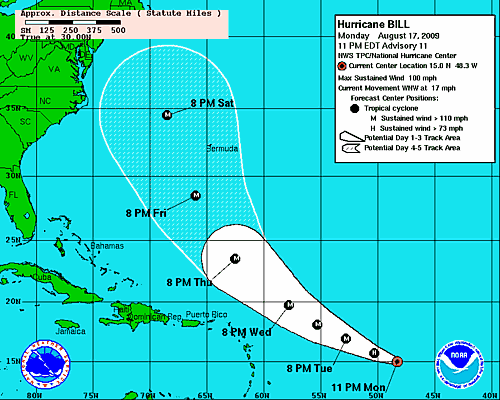Hurricane Bill Continues to Move Northwest and for the time being It's Not a Menace to Cuba
- Submitted by: admin
- Environment
- 08 / 18 / 2009

Hurricane Bill has been upgraded to a Category 2 storm and could develop into a major hurricane, the National Hurricane Center said.
At 11 p.m. EDT Monday the center of Hurricane Bill was located about 865 miles east of the Lesser Antilles, forecasters said. The storm was moving toward the west-northwest at about 17 mph and was expected to continue on that track for the next day or two before making a gradual turn to the northwest Wednesday.
Maximum sustained winds were almost 100 mph with higher gusts and the storm was expected to gain strength during the next 48 hours. Bill could become a major hurricane Tuesday or Wednesday, forecasters said.
The storm is very large, with tropical winds extending out 150 miles, so Bermuda faced a potential threat even if the Atlantic island avoided a direct hit, said Nick Camizzi, a forecaster with the British territory's weather service.
"We are keeping an eye on it for sure," Camizzi said.
It was too soon to tell if Bill would threaten the eastern coast of the United States, said John Cangialosi, a meteorologist at the U.S. National Hurricane Center. It was not expected to threaten Florida.
"The system is certainly large and eventually will be a powerful hurricane," Cangialosi said. But colder waters and wind shear could weaken it when it moves farther north.
At 11 p.m. EDT Monday the center of Hurricane Bill was located about 865 miles east of the Lesser Antilles, forecasters said. The storm was moving toward the west-northwest at about 17 mph and was expected to continue on that track for the next day or two before making a gradual turn to the northwest Wednesday.
Maximum sustained winds were almost 100 mph with higher gusts and the storm was expected to gain strength during the next 48 hours. Bill could become a major hurricane Tuesday or Wednesday, forecasters said.
The storm is very large, with tropical winds extending out 150 miles, so Bermuda faced a potential threat even if the Atlantic island avoided a direct hit, said Nick Camizzi, a forecaster with the British territory's weather service.
"We are keeping an eye on it for sure," Camizzi said.
It was too soon to tell if Bill would threaten the eastern coast of the United States, said John Cangialosi, a meteorologist at the U.S. National Hurricane Center. It was not expected to threaten Florida.
"The system is certainly large and eventually will be a powerful hurricane," Cangialosi said. But colder waters and wind shear could weaken it when it moves farther north.
Comments